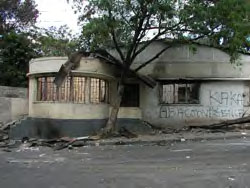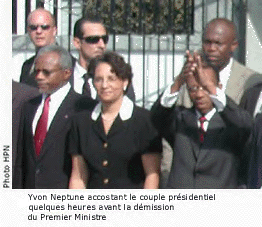| Want to send this page or a link to a
friend? Click on mail at the top of this window. |
| Otto Reich Tackles a Big Repair Job, Hemisphere Policy |
Otto Reich, President Bush's new Assistant Secretary of State for Western Hemisphere
Affairs, sat down with me on Tuesday and talked about the administration's vision for
Latin America and the Caribbean. What emerged was clear: after eight years of drift,
serious policy makers are back in charge. "Dialoguing" with guntoting power
seekers and propping up corrupt regimes is out, which may help explain why the Reich
nomination ran into so much political flak from the Senate left, forcing the president to
put him in office through a recess appointment.
_______________ _______
The Americas
By Mary Anastasia
O'Grady ______________________ |
What remains murky, however, in light of domestic
protectionist pressures on the administration, whether Mr. Bush will have the nerve and
political skill to deliver on the centerpiece of his hemisphere policy, which calls for
freer trade. Without rapid trade liberalization, the rest of the administration's goals
for the region become |
| exponentially more difficult, maybe even impossible. |
After a rather promising start to the 1990s decade, Latin America and the Caribbean
steadily slouched toward chaos, partly because there was no meaningful leadership from the
U.S. When Bill Clinton announced in 1994 that there would be a Free Trade Area of the
Americas, unilateral trade opening stopped dead, with Latins preferring to hold all
tariffs as chips for future negotiations. Institutional and economic reform ground to halt
in most nations. Then the trade agenda stalled.
The Clinton sleaze
factor also came into play, making some of the most decadent of Latin American governments
seem not so bad by comparison. Today the region is mired in crime and characterized by
financial instability, trade protectionism, economic malaise, political upheaval,
terrorism, and now, an officially recognized war in Colombia.
Fortunately none of this
seems to discourage Mr. Reich, who goes about his new job with Reaganesque optimism and a
love of liberty born of his early life as a Cuban subject to Fidel Castro's tender
mercies. He wants to be tough on terrorism and speaks passionately about free trade. Mr.
Bush's March visit to Monterrey, Lima and San Salvador, he says, is a signal to Latin
America that despite the heavy attention to the war in Afghanistan, helping the region
advance ranks high on the Bush agenda.
Mr. Reich began
his remarks by noting that in the president's priorities for the Western Hemisphere
"the common denominator is freedom." That might sound like political
boilerplate, but Mr. Reich is really talking about an essential for economic development.
"Political and economic freedom," he says "translate into economic
opportunity, and the vehicle we plan to use to drive that is the Free Trade Area of the
Americas. For that, of course, you need Trade Promotion Authority."
"We want
security. This is the fight against terrorism. And we want governmental integrity. That's
the fight against corruption and the proper use of governmental resources. Not just
avoiding malfeasance but being efficient and utilizing market forces, less government
intervention in the economy and more attention to private enterprise and individual
initiative."
"Supporting
democracy," he says, "is not just having an election every four years and
forgetting what happens in between. We want to try to support the strengthening of
democratic institutions." And "governmental integrity is a very important
component because corruption is one of biggest obstacles to economic development ... the
problem with corruption is that not only does it steal resources from the people but it
corrodes the confidence of the people in their institutions." He says that one of the
administration's tools to fight this will be a practice of the revoking of U.S. visas of
government officials who have stolen from the public purse.
| The office of the Haitian democratic
opposition, right photo. It was consumed by flames on December 17, 2001 after
Jean-Bertrand Aristide ordered his bandits to set it ablaze.
Freedom, trade openness and good governance, these ideas are hardly new. But they were
not advanced much during the Clinton years. Besides equivocation on trade, there was a
remarkably close relationship between the U.S. administration and some dubious regimes,
such as the Menen government in Argentina. Mr. Clinton's "special Envoy to Latin
America" was Thomas "Mack" McLarty, a close crony who spoke no Spanish. In
Haiti, Joseph P. Kennedy II and former Democratic National Committee finance man
Marvin Rosen went into business with Haitian President J.B. Aristide, whose Lavalas |
|
| party was noted for its ruthlessness toward any political opposition. For
whatever reason, Mr. Clinton never could make a very good case against corruption to Latin
leaders. |
Thankfully for 7 million Haitians, the Bush policy with regard to Mr. Aristide, whose
style of government has been condemned by both left- and right-of-center figures, is
markedly different from the Clinton policy. "We are trying to use our resources to
bring about political and economic reforms from the government of Jean-Bertrand
Aristide," says Mr. Reich, "although, frankly I have to admit it, very
unsuccessfully so far. He doesn't seem to be responsive to almost anything, any outside
pressure or inside pressure. He wants to put pressure on us to give him more money without
maintaining reform."
| Photo, right: Jean-Bertrand Aristide,
left, and wife Mildred Trouillot- Aristide, center, with American bodyguards, second
row. Man with red tide, front, is de facto Senator Yvon Neptune. Secretary
of State Colin Powell went to Haiti as a private citizen to help the U.S. effort to return
Mr. Aristide to power. "He has said he has a right to be
disappointed at what has happened there," Mr. Reich says. "There isn't
democracy, there isn't economic development, there's a great deal of crime, a great deal
of corruption and allegations of narcotics trafficking."
On Colombia, Mr. Reich says,
"We're asked for $98 million dollars to defend the Cano Limon pipeline because it
represents such a large amount of income to the government of Columbia. They lose $40
million a month from the sabotage of the pipeline." Congress has not yet approved
that |
|
| request but Mr. Reich detects a mood of realism among members he has met
with since Colombia's decision to end the "peace process" a week ago. They
"understand that there's no daylight between narcotics traffickers and the terrorist
groups; that they represent a danger to the region." |
It's refreshing to hear a U.S. official condemn Mr. Aristide and Colombia's guerrillas.
But as Mr. Reich says, the U.S. wallet also has limits. This reinforces the fact that the
bulk of the burden of change is on the shoulders of wealth-creating trade. An
administration that placates protectionists is not likely to be able to lead the region to
open markets, security and strong democracy. Either Mr. Bush will lead on trade or Latin
America will founder.
Ms. O'Grady
edits the Americas.
*The
Wall Street Journal, Friday, March 1, 2002
Editor's notes: We reprinted the above column, with the exception of the
photographs, from the Wall Street Journal for your review.
| Wehaitians.com, the scholarly journal of
democracy and human rights |

